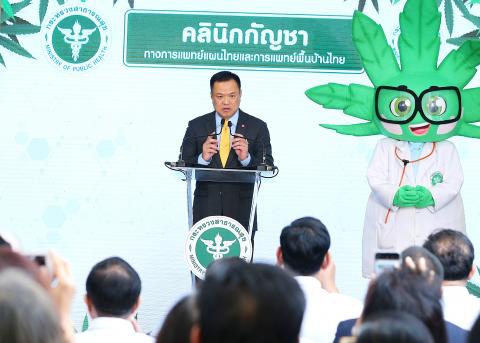Thailand yesterday opened its first full-time clinic specializing in traditional and alternative cannabis-based medicine, as part of a move by the government toward developing a medicinal cannabis industry.
“This is a pilot clinic, because we cannot produce enough doctors with expertise in cannabis,” Thai Minister of Public Health Anutin Charnvirakul told reporters at the opening ceremony in Bangkok.
“Today marks the beginning. We are fighting for the better health of Thai people and fighting for a better economy,” he said, standing next to a marijuana leaf mascot wearing a doctor’s coat.

Photo: EPA/EFE
Patients are to receive treatment free of charge in the first two weeks, he added.
Hundreds of mostly elderly Thais waited to receive the 5mg to 10mg vials of oil for muscle aches, though some came bearing more serious ailments — such as Natjuta, born with cerebral palsy and confined to a wheelchair.
Her mother, Supatra Ulapatorn, said cannabis oil helps her daughter to sleep better and stay calmer.
“She does not sleep well which causes me not to sleep either,” the 60-year-old said. “She is more calm now, so I think it works.”
Thailand, which has a tradition of using cannabis to relieve pain and fatigue, legalized marijuana for medical use and research in 2017 to boost agricultural income.
There are already about 25 cannabis clinics attached to general hospitals around the nation, but, unlike the pilot clinic, they operate for just a few days a week due to a lack of specialized staff.
The largest producer of medicinal cannabis is the ministry’s Government Pharmaceutical Organization.
Kasetsart University director of medical cannabis research Natakorn Thasnas said that the university would supply 2,200kg of cannabis leaf to the ministry.
Cannabis production, cultivation and sale has been limited to licensed producers for the next four years to protect the domestic industry. Only hospitals and research facilities are allowed to apply for cannabis production and extraction licenses, but the government is reviewing regulations to enable Thai businesses to apply for permits.
Thailand last year dropped cannabis and hemp extracts from its narcotics list, and proposed a law that would allow each household to grow six cannabis plants.
Four types of drugs, containing different combinations of cannabidiol and tetrahydrocannabinol, the psychoactive ingredient in cannabis, were given to patients to treat migraine, insomnia, neck pain and muscle stiffness, the ministry said in a statement.
The pilot clinic expects to cater to between 200 and 300 patients daily.
“I was worried at first, but I studied the effects and decided it was better because it’s natural,” said Waraporn Boonsri, 69, who received four vials of cannabis oil to help her sleep.
Nearly 2,200 patients have registered at the clinic, a health official said.
Anutin said there are plans for 77 clinics to be opened across the nation, with one in every province.
Recreational use and trade of marijuana remains illegal, with anyone caught with a joint facing up to 10 years in prison.

Four people jailed in the landmark Hong Kong national security trial of "47 democrats" accused of conspiracy to commit subversion were freed today after more than four years behind bars, the second group to be released in a month. Among those freed was long-time political and LGBTQ activist Jimmy Sham (岑子杰), who also led one of Hong Kong’s largest pro-democracy groups, the Civil Human Rights Front, which disbanded in 2021. "Let me spend some time with my family," Sham said after arriving at his home in the Kowloon district of Jordan. "I don’t know how to plan ahead because, to me, it feels

Polish presidential candidates offered different visions of Poland and its relations with Ukraine in a televised debate ahead of next week’s run-off, which remains on a knife-edge. During a head-to-head debate lasting two hours, centrist Warsaw Mayor Rafal Trzaskowski, from Polish Prime Minister Donald Tusk’s governing pro-European coalition, faced the Eurosceptic historian Karol Nawrocki, backed by the right-wing populist Law and Justice party (PiS). The two candidates, who qualified for the second round after coming in the top two places in the first vote on Sunday last week, clashed over Poland’s relations with Ukraine, EU policy and the track records of their

‘A THREAT’: Guyanese President Irfan Ali called on Venezuela to follow international court rulings over the region, whose border Guyana says was ratified back in 1899 Misael Zapara said he would vote in Venezuela’s first elections yesterday for the territory of Essequibo, despite living more than 100km away from the oil-rich Guyana-administered region. Both countries lay claim to Essequibo, which makes up two-thirds of Guyana’s territory and is home to 125,000 of its 800,000 citizens. Guyana has administered the region for decades. The centuries-old dispute has intensified since ExxonMobil discovered massive offshore oil deposits a decade ago, giving Guyana the largest crude oil reserves per capita in the world. Venezuela would elect a governor, eight National Assembly deputies and regional councilors in a newly created constituency for the 160,000

North Korea has detained another official over last week’s failed launch of a warship, which damaged the naval destroyer, state media reported yesterday. Pyongyang announced “a serious accident” at Wednesday last week’s launch ceremony, which crushed sections of the bottom of the new destroyer. North Korean leader Kim Jong-un called the mishap a “criminal act caused by absolute carelessness.” Ri Hyong-son, vice department director of the Munitions Industry Department of the Party Central Committee, was summoned and detained on Sunday, the Korean Central News Agency (KCNA) reported. He was “greatly responsible for the occurrence of the serious accident,” it said. Ri is the fourth person